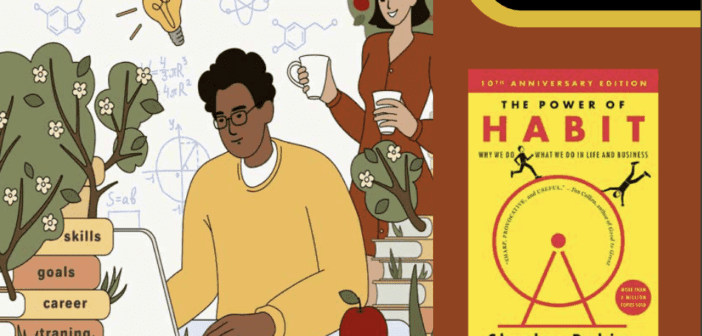Book Title: The Power of Habit: Why We Do What We Do in Life and Business
Author: Charles Duhigg
Category: Self-improvement and Business
Publishers: Random House (Penguin)
What’s the one thing that every single adult human has in common? A habit. Whether we realise it or not, there are certain things that we all do on a routine basis. Sometimes, it’ll take someone else pointing out a habit you have, before you can notice it – other times, you become consciously aware all by yourself.
As with most other things, habits can either be negative, or positive- and they have a direct influence on our everyday lives. There’s a science behind why you take that packet of crisps every time you sit down to watch TV, or why you always hit snooze on your alarm in the morning, despite your best intentions to wake up early and be productive. If you automatically reach for your phone, the moment you wake up, you may not have realized it, but the reels and videos you watch upon waking up every morning can have a significant impact on your productivity and temperament all through the day.
In his book, Charles Duhigg writes about Saddleback Church in the USA where the resident pastor helped members of his congregation overcome addiction, strengthen their faith, and improve their lives by changing their ‘keystone habits’. These are small, foundational habits that have a ripple effect on other areas of our lives.
Pastor Warren asked his congregation to start their day with a simple, impactful routine, like reading a passage from the Bible or praying, which would in turn help them set a positive, and productive tone for the rest of the day. By focusing on these keystone habits, Warren was able to help people create positive changes in their lives, leading to better mental and emotional health, stronger relationships, and a deeper sense of purpose and meaning. Muslims too can begin their day by reading an aya from the Holy Quran and performing the morning fajr prayer to boost their daily productivity.
Habits are a basic part of our existence as humans which is why we must understand how they are formed and how to change them. Duhigg’s book “The Power of Habit” takes readers on a fascinating journey through the science of habit formation and provides real-life examples of how our habits can either make or break us.
The author uses appealing case studies, and insightful analysis to empower us with the ability to take charge of our habits and improve the quality of our lives. With entrancing narratives that span from corporate boardrooms to historic social movements, he distills vast amounts of information and offers a fresh perspective on human behavior.
Readers will interact with one of the most successful companies in the world. Duhigg talks about Procter & Gamble and its struggle to sell a new product called Febreze. Marketers studied videos of people making their beds, hoping to uncover a breakthrough that would make the product a success. After extensive research, they discovered a subtle pattern that allowed them to tweak their advertising approach. Febreze went on to become a billion-dollar-a-year sensation, defying preliminary expectations of failure.
Duhigg showcases the training regimes of Olympic swimmer Michael Phelps, the innovative strategies of Starbucks CEO Howard Schultz, and the steadfast commitment of civil rights hero Martin Luther King Jr. to demonstrate how the right habits can propel us to greatness. According to Duhigg, changing your habits is not as hard as you think, you must change your mindset, and understand the science of habit formation. His book explains that nearly all habits are formed in a similar fashion. It’s usually a (3) step transition called ‘the habit loop’: Transition 1: CUE, Transition 2: Routine, Transition 3: Reward- A reward is the outcome or consequence that follows the conclusion of the routine phase. It is what reinforces the loop and makes it more likely to happen again in future. Rewards too, can be physical, emotional, or mental in nature. They provide a sense of gratification or fulfillment that motivates our brains to remember and repeat a habit.
By understanding habits through this 3- step transition, we can begin to interpret and recognize the components of what needs to be in place for habits to form. The absence of any one part of the loop will prevent the habit from forming.
What makes “The Power of Habit” stand out in comparison to other self-help books is Duhigg’s skill at explaining the science behind habit formation in a way that is both accessible and compelling. Overall, Duhigg’s case studies demonstrate how habits can be harnessed for positive change in all areas of life, from personal well-being to business success to public health. By understanding the science of habit formation and identifying key habits, individuals and organizations can transform their lives and achieve their goals.
Reviewed by Angela Mutiso
This book is available in most well-stocked bookshops around the country




